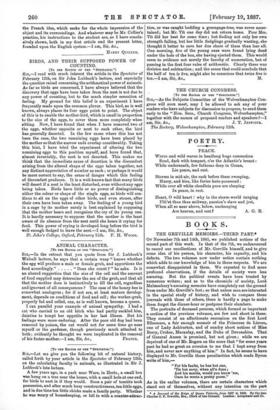BIRDS, AND THEIR SUPPOSED POWER OF COUNTING.
[To rue Berms or rue Grecroroe."1
Sin,—I read with much interest the article in the Spectator of February 12th, on Sir John Lubbock's lecture, and especially the question raised concerning the arithmetical power of animals. As far as birds are concerned, I have always believed that the discovery that eggs have been taken from the nest is not due to any power of counting, but to the much simpler sensation of feeling. My ground for this belief is an experiment I have frequently made upon the common plover. This bird, as is well known, always places its four eggs point to point. The object of this is to enable the mother-bird, which is small in proportion to the size of the eggs, to cover them more completely when sitting. Now, I have found that when I have removed two of the eggs, whether opposite or next to each other, the bird has generally deserted. In the few cases where this has not been the case, the two remaining eggs have been placed by the mother so that the narrow ends overlap considerably. Taking this hint, I have tried the experiment of altering the two remaining eggs to this position myself, and have found that, almost invariably, the nest is not deserted. This makes me think that the immediate cause of desertion is the discomfort arising from the altered shape of the eggs taken together, not any distinct appreciation of number as such ; or perhaps it would be more correct to say, the sense of danger which this feeling of discomfort produces. It is a well-known fact that many birds will desert if a nest is the least disturbed, even without any eggs being taken. Birds have little or no power of distinguishing either the colour or shape of the single eggs, as birds will con- tinue to sit on the eggs of other birds, and even stones, after their own have been taken away. The feeding of a young bird in a cage by its mother surely is best explained by supposing that the mother hears and recognises the cry of its young one. It is hardly necessary to suppose that the mother is the least aware of its absence from the nest until she hears it crying for food. This power of crying is developed long before the bird is well enough fledged to leave the nest.—I am, Sir, &c., St. lohn's College, Oxford, February 15th. F. H. Woons.


































 Previous page
Previous page